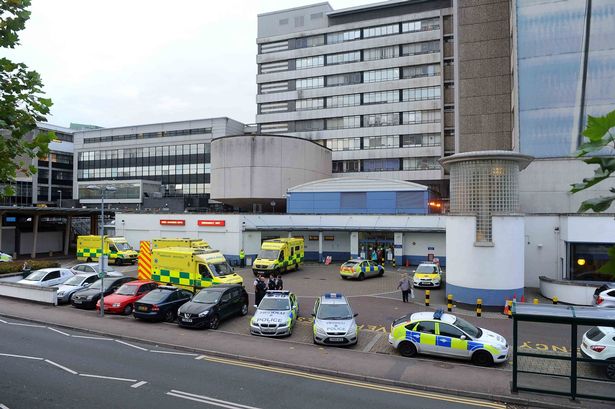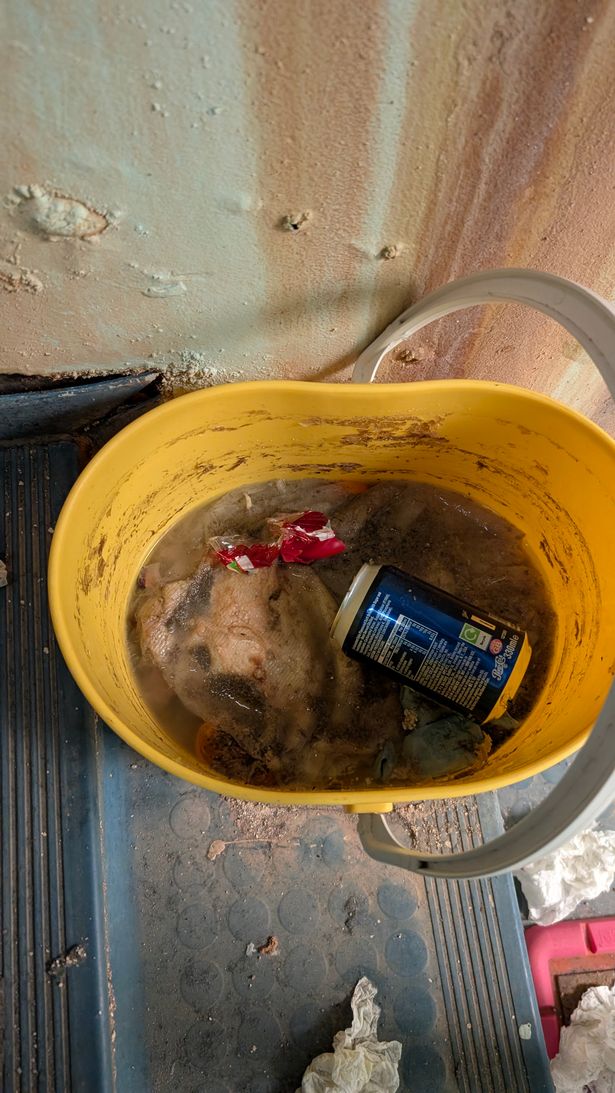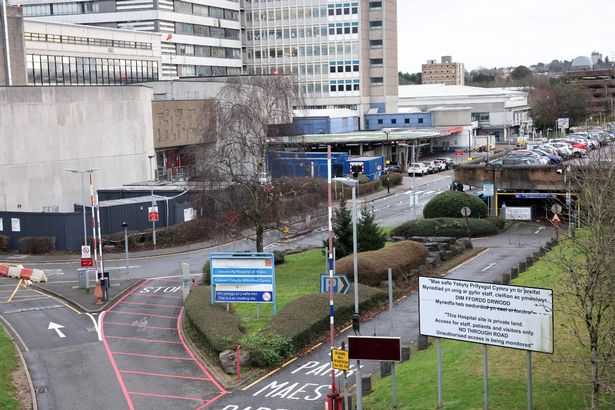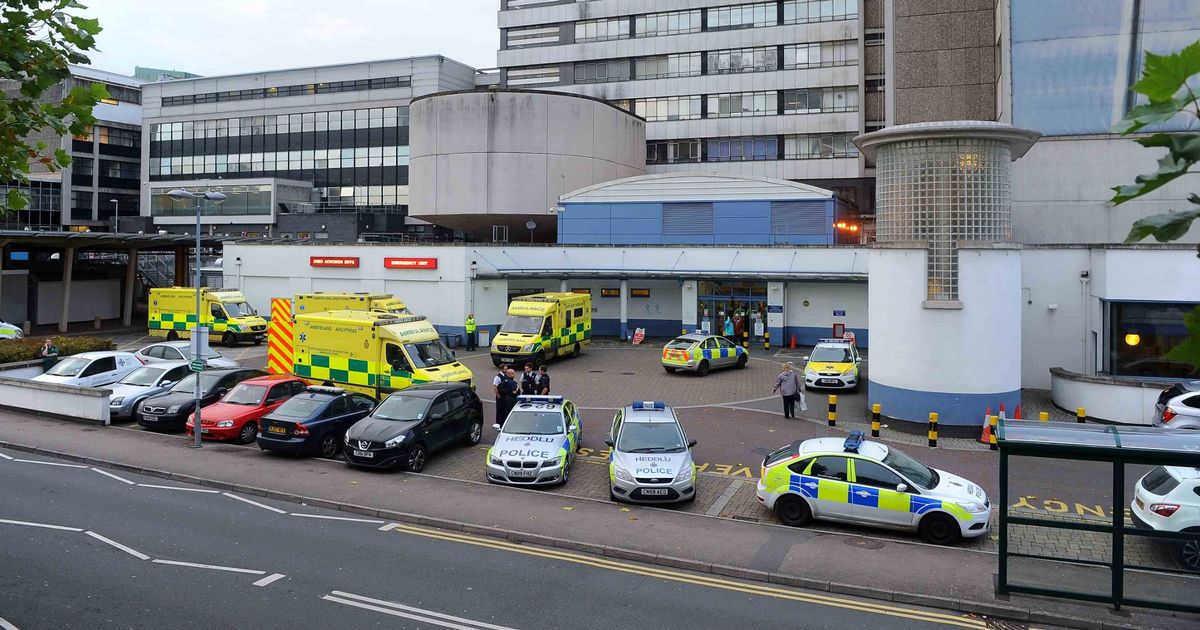Top doctors are seriously concerned over how the hospital is run The University Hospital of Wales, Cardiff(Image: WALES NEWS SERVICE)
The University Hospital of Wales, Cardiff(Image: WALES NEWS SERVICE)
The most senior medical staff at Wales’ flagship hospital have written to the chair of the health board to raise their concerns about the way it is being run. The extremely rare step by Cardiff and Vale university health board’s senior consultant body – which has more than 100 members – shows the depth of concern about the state of services at the University Hospital of Wales.
The letter has not been made public by the consultants or by the health board but was raised at an accountability meeting held by the cabinet secretary for health, Jeremy Miles. WalesOnline has been told that the letter raises a number of serious concerns about the failure to address major problems with the hospital’s infrastructure and the way services are being run.
Cardiff’s University Hospital of Wales is home to many services used by people from a much wider area. However it was built in the 1960s, has major structural issues, and long-mooted plans for a replacement have not progressed far.
Read more: Whistleblowers pictures show leaks and water damage at Wales’ biggest hospital
 Whistleblower’s images of leaks and water damage at University Hospital of Wales
Whistleblower’s images of leaks and water damage at University Hospital of Wales
The letter also accuses management of failing to take “clinical input on key decisions”. In a public accountability meeting on Thursday, Mr Miles questioned senior figures at the health board on the grievances aired in the letter.
“Clearly we’re not getting it right”, replied the health board’s chief operating officer Paul Bostock, though he insisted bosses do not sit in “darkened rooms” and vowed they would work to engage more with consultants.
Earlier this year a damning report on the operating theatres at the University Hospital of Wales found chronic leaks risked affecting patient confidence, poor lighting made operations challenging, and corridors were “cluttered” due to insufficient storage.
 (Image: WalesOnline/Rob Browne)
(Image: WalesOnline/Rob Browne)
We understand the consultants behind the letter considered expressing no confidence in the health board’s management but ultimately decided not to at this stage.
In September we reported on the case of Gareth Idris Johnson, a much-loved 41-year-old dad-of-three who died after the hospital’s maintenance problems led to him being moved to a different unit following an operation.
This prompted coroner Kerrie Burge to warn the health board there was a risk of more deaths if UHW’s problems were not addressed. Whistleblowers have frequently spoken to us about the horrendous conditions at the hospital in Heath.
Reacting to news of the consultants’ letter, the Tories’ shadow health secretary James Evans said it would be a “dereliction of duty” if the Welsh Government did not “step in to clear up this mess”, adding: “Patients deserve better.”
And Plaid Cymru health spokesman Mabon ap Gwynfor said: “This letter is extremely concerning and reflects what Plaid Cymru has been saying about the state of the estate and the need for clinical input not only at board level, but also at Government level.”
He claimed the Labour Government has “no plan and no ambition to get to grips with the multiple crises faced by our health service here”.
In July the Government did escalate the health board to a ‘level four’ targeted intervention due to “serious concerns relating to governance, culture, quality and safety and operational pressures” – falling short of level five, which would mean placing it in special measures. It remains at level four.
The recent report into the hospital’s operating theatres found illicit drug use, racism, bullying and staff sabotaging each other. It also pointed to “significant delays in fixing leaks” and “several occasions when pigeons were found in trauma theatre or on the theatre corridor”.
In the public accountability meeting, the health board’s chairwoman Kirsty Williams said she was grateful to consultants for raising concerns and that she had met with the chair of the consultant body.
“I understand some of their frustrations, I get it,” she said. “When I first met Suzanne [Rankin, the health board’s chief exec] before I took up post, she spent a lot of that meeting talking to me about the UHW.
“To be honest, I thought maybe she was exaggerating what she was telling me. I was a bit sceptical. And then I went to the Heath and we walked around. I understand what our consultant colleagues are telling us in terms of the impact of that infrastructure on them and not just an impact on their morale but actually towards efficiency as well.”
A health board spokeswoman told WalesOnline its executive team fully acknowledges “the legitimacy of the concerns raised”.
She added: “We have provided a detailed response with an open offer to work with and co-design health services across all areas they raise.”
In May we reported that plans to build a replacement for the hospital — first announced by the health board in 2021 — had stalled.
Work was initially scheduled to start in 2025 and be complete three years later but there has been a lack of clarity over what progress has been made.
A Welsh Government spokesman has now told us the health board is still “developing a plan for the future of both the University Hospital of Wales and University Hospital Llandough sites”. He added: “Following this, we will work with the health board about options and timelines.
“We have been clear with the health board about their need to improve the culture and leadership, particularly addressing concerns raised in the recent internal reviews and letter from consultants.
“Cardiff and Vale university health board remains in level four escalation and we are working with them to agree appropriate intervention support.”
Recent controversies involving the health board include an external probe into the Hafan y Coed mental health unit after scathing inspections, a failure to act when an electroconvulsive therapy clinic manager bullied colleagues for years, and allegations of unauthorised visitors being invited in to watch operations.
In the interests of transparency, we asked if the health board would release the letter from consultants. Its spokeswoman told WalesOnline: “We will not be providing a copy of the letter.”
Asked about the plan to improve facilities, she said the health board recently used Welsh Government funding for a site conditions survey to “fully understand the infrastructure” and address “the most pressing risks earliest”.
“A survey of estate utilisation across all sites is also underway which should enable us to identify opportunities to reduce the overall university health board footprint, optimise use of the best facilities and create ‘decant’ space to enable works to be undertaken on the Heath site. This will be important to enable a phased approach to a University Hospital of Wales build programme.”
She added: “Most recently we shared an early-stage concept for an acute / tertiary services new build on the Heath site with the clinical board directors which was well received.”
The spokeswoman also vowed: “We are committed to developing a structured approach to ensure clinical leadership is central in developing the clinical services plans and future infrastructure in partnership with colleagues from Welsh Government.
“Nonetheless, it is clear that we all collectively have a lot of work to do in improving reciprocal communication and engagement across the whole health system.”
If you would like to contact us about an issue we should be investigating, email us at conor.gogarty@walesonline.co.uk
